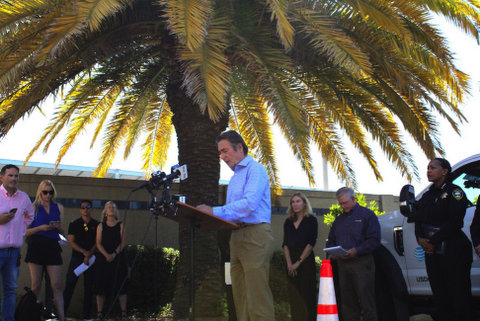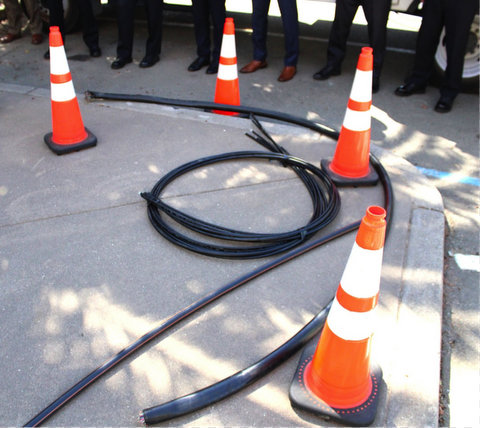
06 Sep Local Leaders Ask for Public’s Help to Stop Rising Copper Wire Theft

Contra Costa County District 1 Supervisor John Gioia speaks about how copper is being stolen and what is being done to stop it at a press conference in North Richmond on Tuesday.
Story and photos by Joe Porrello
In Richmond, 220 copper wire thefts have been reported since last September — 200 more than the 20 reported in the 12-month period from September 2022 to 2023.
Richmond Police Chief Bisa French shared those statistics at a press conference Tuesday in North Richmond, joined by Contra Costa County District 1 Supervisor John Gioia, other local law enforcement and business representatives to address this increase in thefts.
This is neither a new problem nor confined to Richmond. Back in 2008, the FBI said that copper wire thefts and the prolonged outages they can cause pose “a threat to public safety and to U.S. critical infrastructure.” It said “targets include electrical substations, railroads, security and emergency services.” It described specific incidents in which copper theft prevented people from being warned of a tornado, thousands were left without power, and communications between pilots and air traffic control were threatened.
Locally, French said, “these thefts affect people’s lives every day, from having the ability to stay connected on the internet, the ability to access local 911 services, the public safety hazards that come with down traffic signals and lights.”
In June, emergency lines in Pinole, Hercules and San Pablo were out for a week when 16,000 wires along an AT&T communication cable were cut by thieves to steal 400 feet of copper wire.
Those same cities, along with Richmond and El Cerrito, now have a group of network security cameras meant to deter and catch people stealing copper, says El Cerrito Police Chief Paul Keith.
Since last September, Richmond Police has teamed up with local businesses, utility providers and residents to combat the problem — leading to 10 arrests in that span. But often the thieves are too quick.
“We receive calls, and by the time officers get there, they’re gone,” said French.
The Richmond police chief says drug addiction is one of the main linchpins behind copper theft, and that it happens all hours of the day without a pattern or connection from one thief to the next.
“We found that a lot of the thefts are involving unhoused people that are just selling on their own,” said French. “For everybody that we arrest, there’s somebody coming right behind them the next day to do the same thing.”
Those illegally cutting cables also risk their own safety, as cutting the wrong wire can be fatal.
- A demonstration at the press conference in North Richmond illustrated how cables are cut and stripped for copper.
Now, Richmond’s police force has begun a “See Something, Say Something” public campaign to help draw awareness to the issue and let residents know to call 911 if they see something suspicious.
Chief Keith says to look out for activity around power poles outside of business hours like late at night, weekends and holidays, along with unmarked vans or covered license plates.
“To the general public: We want your help,” Gioia said.
But it will take help from businesses too.
Some recycling companies knowingly accept illegal copper and look the other way, according to Gioia, directly going against state law AB 844. Passed in 2008 to counter such practices, the law requires all recycling centers that buy copper to catalog sellers’ faces, thumbprints and merchandise by photo or video, and deal with checks in lieu of cash for a paper trail to follow if necessary.
Tedi Vriheas, vice president of external affairs for AT&T in California and Nevada, says crooked recycling businesses are a big part of the problem because they create a market and incentive for copper to be stolen.
Earlier on Tuesday, her employer filed a lawsuit against ALCO Iron and Metal — one of California’s largest recycling companies — for allegedly purchasing illegally obtained copper with knowledge of its origins.
West Contra Costa is not the only region in the state trying to fight this issue.
According to the L.A. Times, Los Angeles tripled funding last month for its copper wire task force to $600,000 after law enforcement made 82 arrests and recovered 2,000 pounds of stolen copper. Gioia said he wants to follow a similar strategy in Contra Costa County.
Such strides against copper thievery in Contra Costa and other California counties could be pivotal, especially now.
With fire season in full force, as Keith noted, it is crucial for critical communications infrastructure to remain intact so that emergency services and evacuation plans are accessible to those in crisis.
Vriheas said AT&T is offering $5,000 rewards in counties across the state, including Contra Costa, for information on copper theft that leads to conviction. People can report such information by calling AT&T Asset Protection at (800) 807-4205.







No Comments